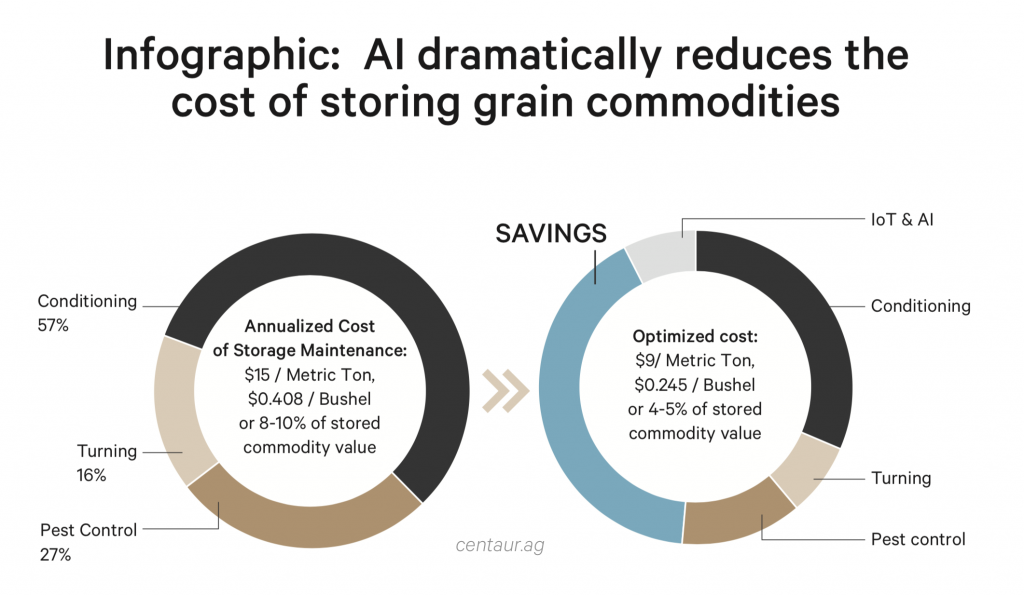The Centaur team is frequently speaking on the importance of adopting cognitive technology in the food industry’s perennial fight against loss and spoilage, and even on the urgency of adopting solutions now to avert a looming food crisis. But working with leading customers in agriculture and food, we often realize that the transformative change promised by technology is gated by the answer to one very pressing and legitimate question: How can these cognitive tools and digital platforms bring benefits in the here and now? So here are some tangible examples which I think will help you if you are faced with this exact question.
Betting on the Weather and Winning Big
Everybody is familiar with how savings can be achieved by automatically adjusting A/C and heating systems based on the actual weather, and even adding presence sensors to the mix to avoid heating or cooling empty rooms. Google’s Nest ‘learning thermostat’ brought this idea to the home. But did you know that the cereal milling industry is spending a lot on energy costs, to pre-emptively condition large volumes of grain sitting in large bins? Cooling down a single grain bin to prevent the formation of mold and fungi, or moving and ‘turning’ grain to avoid destructive insect infestations, drives up the energy bill of a mill by several thousand dollars each year. Now consider that a major food mill operator may own hundreds, if not thousands of these bins loaded with precious grain, and you can imagine that these costs become significant. This directly affects the price of food, and the profit margins of a food company.
How can cognitive technology help? Artificial Intelligence (A.I.) can leverage data from sensors placed in stored product to drive decisions on when and how a particular volume of grain, beans, rice etc. can be conditioned using ambient air flow from the environment, or even chilled air (from a cooling unit). But instead of applying a remediation after a spoilage incident is discovered, which is usually too late to reverse the effects, machine learning algorithms provide predictive information so that conditioning can be applied at the right moment, thus optimizing the cost and the effect of the intervention.
The Centaur Internet-of-Crops® Analytics Platform provides a cloud-based, cognitive system that constantly processes weather and real-time sensor data (e.g. temperature and moisture) collected from grain bins, to drive predictions of grain condition and related quality risks. These predictions detect ‘hotspot’ events weeks or months ahead of time, and can be used in controlling a grain store’s fresh air supply. That is great news for mill and grain elevator operators who have been largely making gut-feeling decisions about all this – without really preventing severe spoilage and loss. How many bins can you keep track of on a given workday? If you let A.I. do it for you, that capacity becomes infinite. And, you’ll have fewer headaches when you check in for work at the plant in the morning.
Keeping Pests out of Food
Insects and pests are a major root cause for food and agricultural product loss across a wide range of commodities, including grains, beans, nuts, raisins, potatoes, produce, and more. Certain insect species are considered so aggressive and predatory that even a single live bug can become a cause for quarantine when found in an international shipment. This poses significant challenges for global trade, complicating compliance and export certification. You don’t want an ocean shipment of corn to be rejected and turned around when it reaches the coast of China.
How can cognitive technology help? Stored product insects are evolving as any live organism, and the methods for eliminating them need to be adaptable and fully automated. The Centaur team is working directly with renowned entomologists and leading pest control companies on a number of solutions against food-preying pests. We build electronic ‘traps’ to detect the presence of insects in a storage facility. Machine learning algorithms are applied to identify each pest caught in a trap, in real time. Thanks to Centaur data analytics, infestation levels can be assessed and predicted, while remediations such as fumigation can be precisely applied. Our algorithms determine the fumigant dosages and treatment duration, thus reducing the cost of Integrated Pest Management (IPM). This serves to make food and agri-logistics more affordable, but more importantly, it means the food products reaching people are safe and fit for consumption.
The aggregate benefit of employing cognitive technology methodologies is readily quantifiable. Based on customer-supplied data, Centaur estimates that manually maintaining products in storage adds an overhead of 8-10% on the price of a grain commodity (see infographic). We are assessing the cost of a full-fledged A.I.-driven solution at a percentage point (1%) of the value of stored product. The returns though are at several percentage points, realized by reduced energy costs, avoided infestations and slashing of the costs related to pest control.

This is not an exhaustive list of what is possible with cognitive technologies today, but should be enough to get one thinking in the right direction. Contact us today to discuss how Centaur sensors and the Internet-of-Crops® Analytics Platform can solve your unique crop and food supply chain management challenges. You can also download our white paper for marketing profitably with AI technology, below:
 15.10.2018
15.10.2018 
